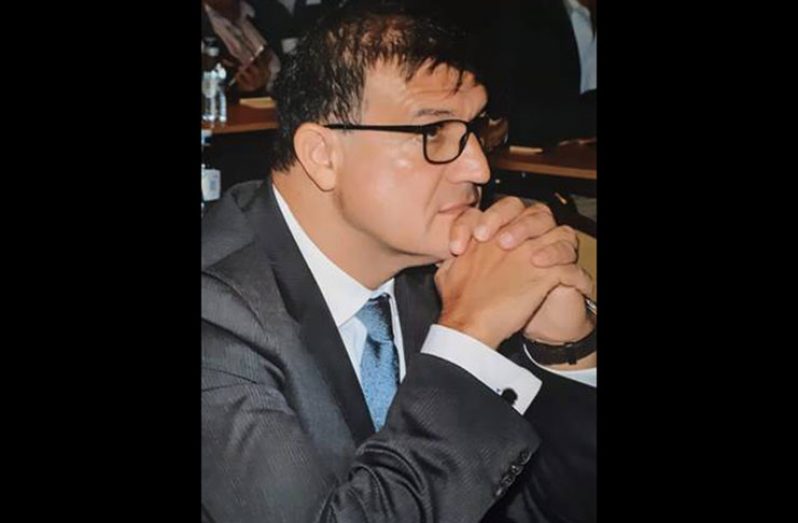…local content consultant
THE strengthening of civil society at the local level to ensure is a key variable in ensuring the success of the Extractive Industries Transparency Initiative (EITI) Guyana has recently embarked upon.
This the opinion of Local Content Consultant Oil and Gas and Mining in Africa, Latin America, the Middle East and Canada, Rene Roger Tissot.
He spoke with the newspaper at the sidelines of the 15th Annual Institute of the Americas’ pre-La Jolla Conference Workshop hosted in San Diego last week on the EITI and several other oil and gas related topics.
Guyana submitted its first EITI report to the International Secretariat on April 25, 2019 aimed at promoting the open and accountable management of oil, gas and mineral resources.
Guyana’s own goals, according to Minister of Natural Resources Raphael Trotman, point towards improving investment climate; strengthening licensing, record keeping, tax collections systems and legal and fiscal frameworks; improving reforms and governance and promoting greater economic and political stability.
The 6,000-page report details payments made by extractive entities; revenues received by Government Agencies; material payments and benefits to these agencies as required by the EITI Standard.
“I understand that Guyana has become a signatory. I think that’s a good idea…I think it’s good at this time because it is never too late to be transparent,” Tissot told the newspaper.
However, in listing a number of limitations which have affected the EITIs of several countries the past, a weak civil society was named as one of the main problems observed.
“The key variable for the EITI to work is the capability of civil society to hold their political leaders accountable and that, in some places, particularly in Africa, has not happened. So even if you have a very strong civil society outside of the country such as Non-Government Organisations etcetera, if in the country’s civil society is not able to make government accountable, the impact and strength of this type of mechanism is weakened,” he explained.
The expert explained that should accountability be lacking, while members of the public will see evidence of discrepancies, the said discrepancies will continue as no one seeks to reproach or lobby for correction of the same.
In other words, a weak civil society in resource rich countries can equate to transparency without accountability. “It’s that linkage and it seems to be missing somehow and forms a problem in many developing countries,” Tissot said.
Questioned of the ways in which civil society can become strengthened to avoid the challenge, the expert listed education as a definite necessity.
He also stressed the involvement of the media is absolutely necessary, stating: “The media needs to be informed but needs to avoid an inflammatory process. Sometimes we tend to react to inflammatory information because it is attractive or sells but the media needs to be very responsible in terms of providing fact and information based and grounded in truth.”
Later explaining how civil society, once strengthened, can ensure its voice is heard, Tissot said that this is best achieved through each citizen utilising their democratic right to vote into power the government which efforts point towards achieving transparency and proper resource management.
“In a democratic system, the political process is the one to decide. Ultimately, if the system is failing, the people in a democracy would choose a different path or a different political party,” he said, adding:
“And it’s not just stating ‘I’m going to elect the other guy’ but it’s also encouraging people to enter into the political arena to represent their constituency in the specific areas.”
Although becoming a signatory of the EITI is voluntary, once implementation begins the country is required to achieve compliance with the EITI Requirements with the participation of all companies and government agencies making or receiving payments.
According to the EITI Secretariat, a country implementing the EITI can be suspended for many reasons — both political and technical.
Following Guyana’s submitted on April 25, 2019, the Guyana Gold and Diamond Miners Association (GGDMA) accused the report as working to cripple the local industry.
It expressed fears of that the information within the report would put small miners at risk of criminal targeting and security risks. Tissot acknowledged the same as “valid points” but stated that such concerns have been raised in the past in other countries and opened the door for discussion on how security can be improved enable the companies and agencies to remain both safe and transparent.
A similar position has been laid by Minister Trotman who referred to the matters raised by the GGDMA as “genuine concerns” assuring that the Ministry and its stakeholders are working to maintain a high level of security for miners in this regard. He also emphasized the importance of the EITI report to Guyana stating that it is an important tool for better and open government and remains “vitally important” for the country’s positive development.




.png)









